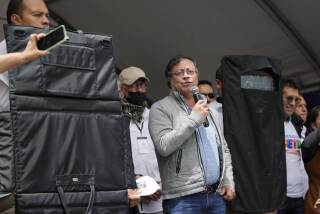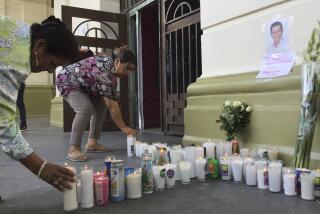Violence votes early in Colombia
VILLARICA, COLOMBIA — Colorful banners bearing mayoral candidate Julio Cesar Marentes’ smiling visage are still festooned around this tiny coffee-growing town even though he was killed by leftist rebels three weeks ago.
Marentes is one of 15 mayoral and city council candidates killed since August by armed groups across Colombia in advance of nationwide elections Oct. 28, when 1,098 municipalities will elect mayors and city council members. Also up for a vote are 32 governorships.
The banners and posters remain in place because they serve as publicity for Marentes’ wife, Maria Eugenia, who has taken his place on the ballot in this Tolima state town about 100 miles southwest of Bogota.
Last week, she received her first death threat, from a caller who asked what size coffin she would need.
“I’m going to finish what Julio Cesar started,” she said Sunday in a brief interview during a campaign rally attended by 300 supporters. “There are too many injustices to tend to for me to be intimidated.”
Augmenting the crowd were dozens of soldiers and police officers sent by President Alvaro Uribe to beef up security.
Julio Cesar Marentes, 44, is believed to have been killed by rebels of the Revolutionary Armed Forces of Colombia, known as FARC, who have declared that any candidate who supports Uribe is a “military target,” meaning targeted for killing.
Four days after Marentes was slain on Sept. 22, the bullet- riddled body of another mayoral candidate and Uribe supporter, Alberto Martinez Barbosa, was found in the neighboring town of Rioblanco. He had been kidnapped two weeks earlier, apparently by the FARC.
Candidates in Colombia routinely are threatened, kidnapped or slain by right-wing paramilitary groups, drug traffickers and political opponents, in addition to leftist rebels. Members of Marentes’ campaign team don’t discount the possibility that his killers were paid by local political foes.
Candidates in 576 municipalities, or more than half of the nation’s total, are running despite the risks of physical violence, according to a study by the election-monitoring group Electoral Observation Mission. In 146 townships, the risk is “extreme,” said mission director Alejandra Barrios.
“When armed groups kill, kidnap or threaten a candidate, their motive is to hollow out a democracy, to generate fear among voters who might otherwise get behind a political cause,” Barrios said. “The only way citizens can deny them is to do their duty and vote.”
Violence is down from previous years as a result of security measures put in place by Uribe, assisted by billions of dollars of U.S. aid under so-called Plan Colombia. Another factor is the demobilization of 30,000 paramilitary fighters, who in past elections used intimidation and killings to cow voters.
An easing of violence and fear is reflected by the fact that far more candidates -- a total of 70,000 -- are running for local office this year than ran in 2003, when the last local elections were held, said Gilberto Toro, director of the Colombian Federation of Municipalities.
“People can run in towns where before they were forced by paramilitaries to resign,” Toro said. “We also see more candidates running in places formerly controlled by the FARC, who in many cases had to retreat to the jungles and mountains to escape the armed forces.”
But Marentes’ slaying underscores the risks that candidates still face in Colombia. Here in Tolima state, dominated by the rugged eastern Cordillera mountain range, the threats are mainly from the FARC, which has waged a bloody, decades-long campaign to discourage candidates.
The risks are especially acute in isolated towns such as Villarica, nestled high up in coffee country and two hours by winding, mostly gravel road from the nearest city, Melgar.
On the day he was killed, Marentes was leading a 15-vehicle campaign caravan to the neighboring village of Riolinda when the cars were stopped at a rebel checkpoint. Marentes and five other candidates and campaign workers were pulled from their cars. After confirming Marentes’ identity, a gunman calmly fired an entire ammunition clip from an AK-47 into the candidate. Family members say he had received no threats.
“These isolated terrorist actions will never destroy democracy,” said Toro, a former mayor in Antioquia state. “But they do cause much suffering to the families.”
Marentes’ daughter, Andrea, a 19-year-old law student in Bogota, said she was happy that her mother is running despite the risks, because otherwise she would be “sitting at home depressed.”
“She knows better than anyone that this is what my father would want her to do,” Andrea Marentes said, adding defiantly that when she gets her degree, she plans to return to Villarica to follow her father into politics.
President Uribe visited Villarica by helicopter Thursday, and eulogized the late candidate after ordering additional security. Over the weekend, the town was packed with army soldiers in full combat gear, with lookouts stationed on top of buildings and at every street corner.
The town is gripped by fear, said Sixto Marentes, the victim’s brother. He said FARC guerrillas had been strong in the area for eight years. His father and one of his brothers emigrated to Canada four years ago after receiving death threats.
“You get used to fear as a way of life,” he said. “Sometimes, I am desperate to go to Canada myself; the system here is so difficult to change.”
More to Read
Sign up for Essential California
The most important California stories and recommendations in your inbox every morning.
You may occasionally receive promotional content from the Los Angeles Times.










